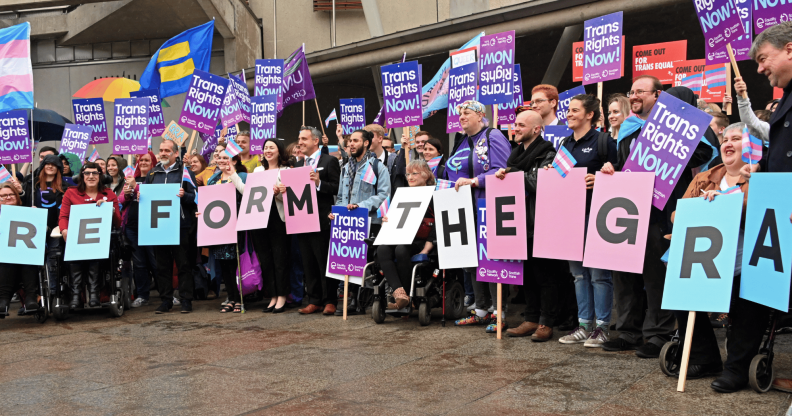Scotland: Gender law reforms pass first vote with ‘overwhelming’ Holyrood support

Legislation reforming the process for trans people to gain legal gender recognition in Scotland has passed its first vote in the Scottish Parliament. (Getty)
A bill to streamline the laborious process on how trans people can change their gender on legal documents in Scotland has passed its first vote.
The vote came just a short while after the end of the chamber debate Thursday (27 October) on plans to bring the process for trans people obtaining a gender recognition certificate (GRC) – the legal recognition of their gender – in line with international best practice.
The legislation sailed through the first vote with 88 Scottish politicians voting in favour and only 33 voting against. The bill will now move on to the second stage where amendments will be considered.
Gender Recognition Reform (Scotland) Bill approved at stage 1 by 88 votes to 33, with 4 abstentions.
Applause in the Parliament at the result
— Equality Network (@LGBTIScotland) October 27, 2022
The Gender Recognition Reform (Scotland) bill has been widely supported by campaigners, the Scottish people and every party in Holyrood – barring the Scottish Conservatives.
Green MSP Maggie Chapman said there was still a long way to go on trans equality in Scotland, but added: “Today, together, we set out a path in the right direction.”
Colin Macfarlane, director of nations at Stonewall, was “delighted” that an “overwhelming majority of MSPs” voted in favour forming the law to allow trans people the right to legal recognition of their gender without “having to jump over outdated medical and administrative hurdles”.
“This is another milestone in Scotland’s journey to join over 30 countries around the world who have moved to a demedicalised process for legal gender recognition, affording trans people dignity and humanity,” he said. “We now look forward to working with all MSPs as the bill goes through the next steps of parliamentary scrutiny.”
Vic Valentine, manager of Scottish Trans, was also delighted that MSPs voted in favour of the bill today.
“The process that trans men and women must currently use to update the sex recorded on their birth certificate has far too many barriers, meaning that at important moments in their lives when their birth certificate is needed, such as when registering to marry or starting college or a new job, they have to show a document that does not reflect who they are, how they live their life, or their other identity documents,” Valentine said.
Valentine added campaigners are looking forward to working with politicians across Scotland’s equalities, human rights and civil justice committee as well as wider parliament in the coming weeks to ensure that the bill is “improved even further before it goes to a final vote”.
Tim Hopkins, director of Equality Network, said Holyrood had continued the “steady progress towards a fair and equal country that respects everyone’s rights” with this vote.
Under current legislation, trans people must apply to a UK gender recognition panel and present reports as well as a diagnosis of gender dysphoria – a process that can take years given the immense wait lists at NHS gender clinics.
Many campaigners have called for these requirements to be changed in order to demedicalise the process for changing gender in the UK. Others have pointed out that the arduous process has meant many trans people haven’t tried to acquire a GRC.
In the proposed legislation, trans people would be able to self-identify without being required to get medical reports or a diagnosis. Applications for a GRC would be handled by the registrar general for Scotland.
Additionally, the requirement that applications need to have lived as their authentic gencer would be cut from two years to three months. It would also lower the minimum age that someone can apply from 18 to 16.

